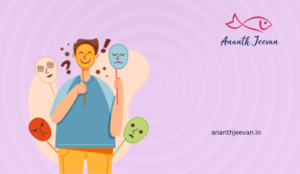
Emotions are complex reaction patterns that involve experiential, behavioral, and physiological elements by which an individual attempts to deal with a significant personal matter or event. The specific category of emotion, for example, shame, guilt, or fear, is determined by the specific significance of the event.
Emotion typically involves feeling but differs from feeling in having an overt or implicit engagement with the world. Feelings are thoughts about the emotions we experience, or feelings are how we interpret emotions. Emotions are believed to be experienced for a short time, lasting for a few seconds, minutes, or at most hours. The word affect is used to describe short-lasting emotional feelings; the word mood, on the other hand, means emotional experiences that endure for a longer period of time.
Emotions are comprised of three major components: (1) Physiological changes in our bodies such as increased heart rate, sweating, blood pressure, etc. (2) Subjective cognitive state – The personal experience we label as emotions (3) expressive behaviour – outward signs of internal reactions.
In one analysis, it was found that about 85% of psychological disorders include disturbances in emotional processing. There are two extremes excess of emotions expressed and deficit of emotions. Emotional disturbance in psychopathology it is essential for us consider the affected emotions. In some disorders all the emotional components are disrupted for example, people with depression may experience prolong sadness and other negative feeling whereas people with antisocial personality disorder show no emotions. Psychopathology reflects the impairment in our emotional processing and emotional reasoning.
The nature of emotions
There are several theories; however, the theory that can go along with the basic common understanding of our emotions is the “Cannon-Bard” theory, which states that various emotion-provoking events induce simultaneously the subjective experiences that we label as emotions and the physiological reactions that accompany them. Another theory named “Schacter-Singer Theory” suggests that our subjective emotions are determined by the cognitive labels that we attach to our feelings.
When we talk about emotions and what we want most out of our lives, we simply say, “I want happiness.” Psychologists have termed this subjective well-being. People from all over the world from different backgrounds simply want to be satisfied with their lives and be happy. However, there are different factors that influence whether a person is happy or unhappy.
Genetic Factor: Some people have an inherited tendency to have an enjoyable and easygoing temperament. This could contribute to their personal happiness and allow them to enjoy life.
Personality Factor: People who are emotionally stable and are in perceived control tend to be happier than those who are emotionally unstable and have low perceived control. Some research findings suggest that people who are optimistic and socially outgoing avoid unnecessary worry and tend to be happier than people who are pessimistic and introverted.
Goals: When goals such as personal, economic, and other goals are realistically set and achieved, the person experiences happiness. To achieve these goals, an individual needs the resources to progress. When they are deprived of the resources, it questions their sense of worth, which leads to a feeling of despair.
External Conditions: The universal condition that contributes to an individual’s happiness, for example, is that wealthy countries are happier than poor countries, or married people are happier than unmarried people. However, there are a few exceptions, such as the fact that some wealthy people are not significantly happier than those with less wealth.
Although many factors impact our emotional well-being, emotional reasoning and processing play a major role in determining our emotional well-being. Emotionally intelligent people tend to be wiser and more content, as they have the ability to be aware of and manage their own and others emotions.
Here to help
If you think you are being bothered by any of these or any other mental health issues, Ananth Jeevan is here to help. Here’s how you can avail our services:
- If you want to talk to someone, there is a helpline you can contact at +918645687456. We are here to listen.
- You can check your mental health status via our AJ App by downloading it from Android Playstore
- If you want to chat anonymously, you can check out the feature in our app.
- If you want Counselling, you can ask for appointments from our WhatsApp number +917661951444
